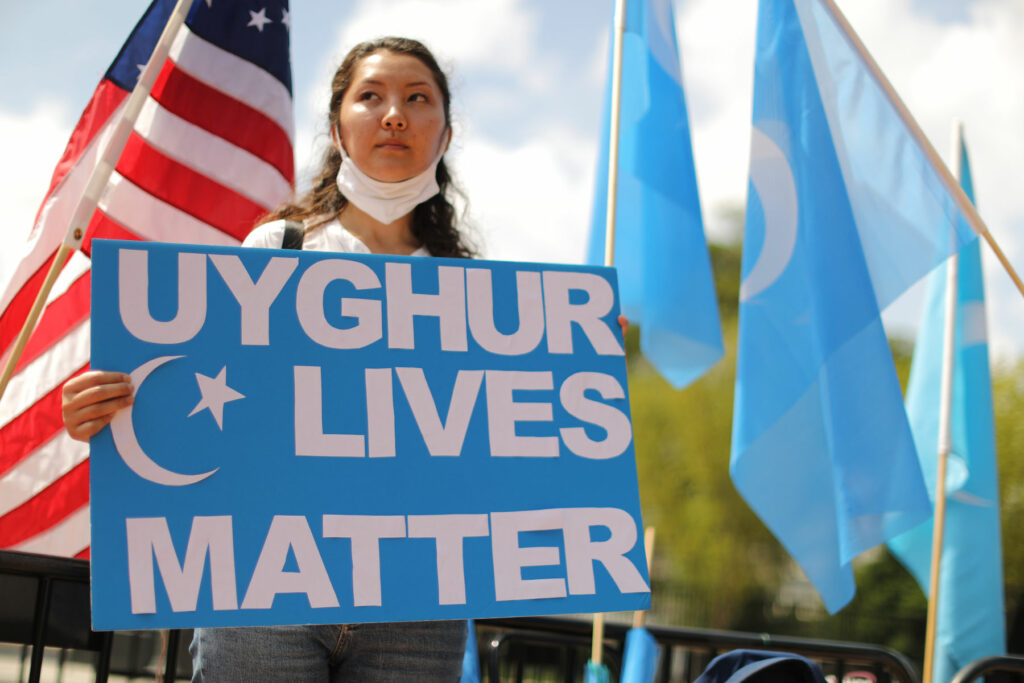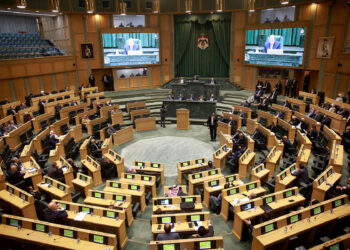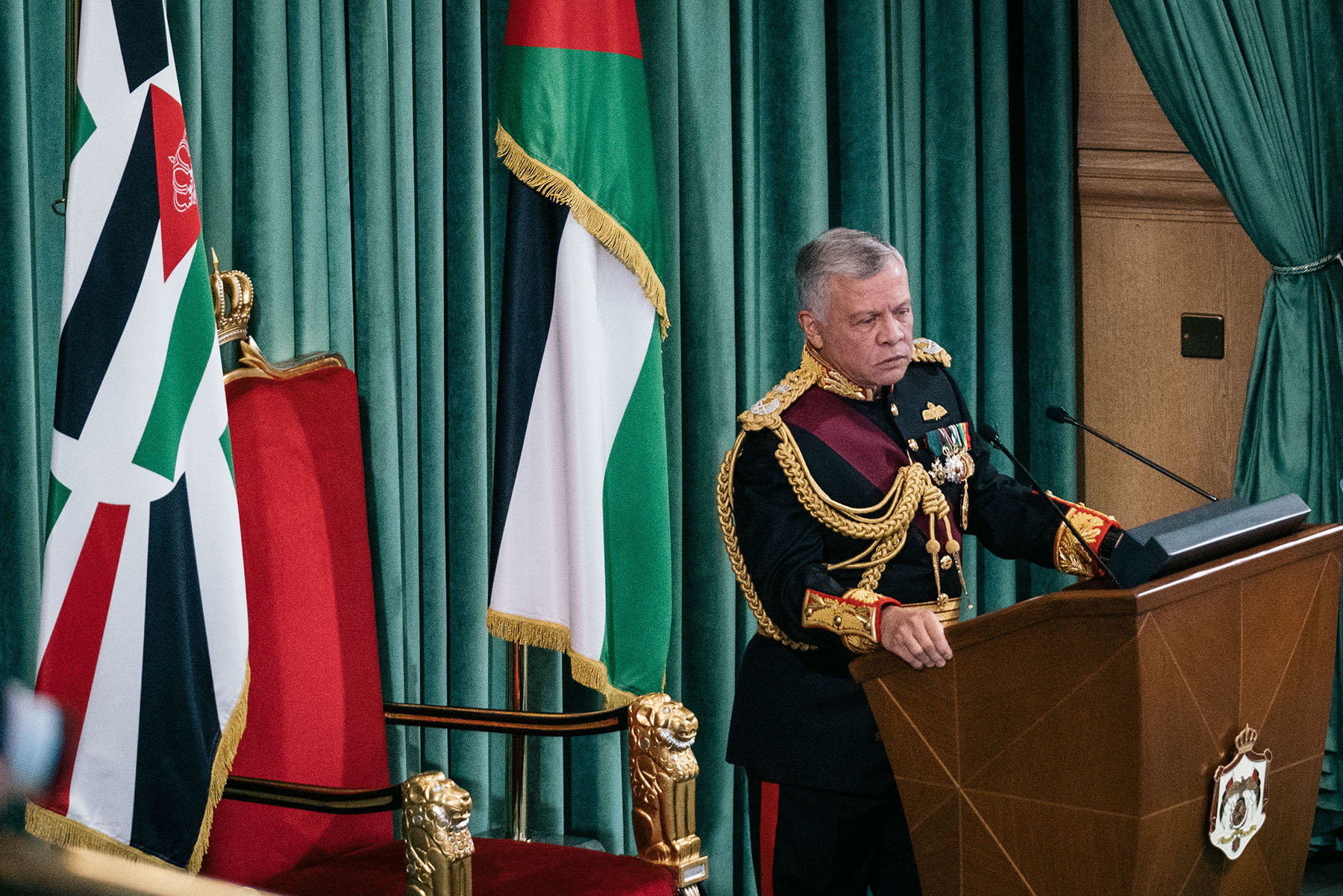Omer Kanat is the Executive Director of the Uyghur Human Rights Project, a human rights research and advocacy organization based in Washington, D.C., and the Executive Committee Chairman of the World Uyghur Congress.
Editor's note: This article is adapted from a paper presented at a recent webinar examining Middle Eastern autocrats' complicity with China's repression of its Muslim communities, cohosted by DAWN and the Uyghur Human Rights Project.
Ramadan this year was not a time of celebration for Uyghurs, but of unspeakable suffering. In our homeland of East Turkistan, Muslims could not observe the holy month in any way. They couldn't fast. They couldn't read the Quran. They couldn't attend Friday prayers. They couldn't even pray at home. If they tried, they would almost certainly be sent to a concentration camp.
Inside the concentration camps of Xinjiang, it is a world of unspeakable brutality. Let me share the words of a Uyghur woman who managed to survive. Gulbahar spent two years in the camps starting in 2017. Her family, who were living in France, campaigned tirelessly for her release. Eventually, the French government put enough pressure on the Chinese government, which decided that they had to let her go. At that time, she weighed less than 110 pounds, and she had scars all over her ankles, because of the shackles kept on her legs for weeks and months at a time. So first, before they returned her passport, officials kept her under house arrest alone in an apartment for several months. There, she was given a special diet so she could heal from her injuries and recover from the near-starvation diet of the camps.
In the camps, "we were beaten if we prayed," she explained. "We had to be careful not to put both hands to our mouths when we were eating, because the guards said: You are secretly praying. We could not close our eyes for even a few moments, when we were in the 'political indoctrination' classes for 11 hours every day. If we closed our eyes, the guards said we were praying, and punished us."
Gulbahar detailed how the indoctrination was much more than punishment for praying. "We had to learn new prayers, to praise and thank the Communist Party, instead of Allah. Before each class, and before we ate, we had to say three praises. We had to praise the Communist Party. We had to praise the great nation of China. And we had to praise Xi Jinping. Then after each class and each meal, we had to give thanks in the same way."
This is a plan to make the Uyghurs disappear. That is why we say it is a genocide.
- Omer Kanat
Outside the camps, Uyghur mosques and pilgrimage sites have been bulldozed. According to research by the Australian Strategic Policy Institute, at least 16,000 mosques in the Xinjiang Uyghur Autonomous Region in far western China are estimated to have been destroyed or desecrated by Chinese authorities since 2017—part of a campaign of cultural erasure. "An estimated 8,500 have been demolished outright, and, for the most part, the land on which those razed mosques once sat remains vacant," the report's authors wrote. The only mosques that have been spared have been turned into tourist sites, like in the cities of Urumqi and Kashgar.
In 2021, the Uyghur Human Rights Project, in partnership with the NGO Justice for All, issued a joint report on China's mass detention of Uyghur imams. We compiled a list of 1,046 imams in East Turkistan who were detained since 2014. Because people are severely punished for even talking on the phone with anyone in a foreign country, it is amazing that we were able to find so many names. But it is only the tip of the iceberg. The true number is certainly much larger. In some cases, an imam's entire family was also detained and taken into the camps—not only their children, but also their grandchildren.
Muhammad Salih Hajim, who translated the Quran from Arabic into Uyghur, as part of a project approved by the Chinese government many years ago, is one of many who died in custody, in either late 2017 or early 2018. He was 82 years old.
Qeyimahun Qari is another imam who recently died in custody. He was first arrested more than 30 years ago; after serving a 15-year sentence, he was released in 2006. Then in 2017, as China's mass detention program began, a village policeman seized him after morning prayers. At the time, Imam Qeyimahun was 59 years old and had no health problems. Two years after he was taken to a camp, Chinese authorities returned his lifeless body to his family.

Just recently, in early March 2023, we heard about yet another death in custody. In 2018, a religious scholar named Baqytkhan Myrzan, who is an ethnic Kazakh, was sentenced by Xinjiang authorities to 14 years in prison, simply for leading prayers on special occasions. His sister Almakhan Myrzan, who lives in Kazakhstan, confirmed to journalists that she received notification from the government that her brother had died in prison at the age of 61. She said that Chinese authorities had ignored the pleas of Myrzan's relatives in China and Kazakhstan to release him for medical treatment.
But it is not only imams. Every Uyghur family has had relatives taken away. The leaked documents from Xinjiang's internment camps, known as the "Xinjiang Police Files," include police photos of people as young as 15, and as old as 73, taken into police stations. We estimate that 1 million Uyghur children have been taken from their families and put into the custody of the state. In these so-called "boarding schools," they suffer the trauma and grief of losing all contact with their parents. The children are intensively trained to hate Islam. They shout slogans every day, praising the Communist Party and declaring their loyalty to the Chinese state.
But the Chinese government goes even further, to make sure Uyghur women will not have children at all in the future. Journalists have exposed how the Chinese government has imposed draconian birth control measures on Uyghurs, Kazakhs and other ethnic minorities in Xinjiang, including IUDs, contraceptives and even forced abortions and sterilizations. Men and women are forced to work in factories, so they cannot marry and form families. The birthrate in Xinjiang dropped by nearly 50 percent between 2017 and 2019.
Truly, this is a plan to make the Uyghurs disappear. That is why we say it is a genocide.
The bottom line is that China has succeeded in recruiting non-democratic governments to deny that it is carrying out a genocide against Muslim minorities.
- Omer Kanat
What is the international response so far? The United States has imposed 117 targeted sanctions in the form of visa bans and Global Magnitsky sanctions, forced-labor import bans, hi-tech export bans and investment bans. Eleven parliaments around the world have passed resolutions condemning the atrocities. The U.N. High Commissioner for Human Rights issued a long-awaited report in August 2022 confirming evidence of torture, arbitrary detention, enforced disappearances and other international human rights crimes. The report concluded that they may amount to "crimes against humanity."
Three times since January 2022, the International Labor Organization has made unprecedented statements of concern about China's state-sponsored forced labor program. Detailed parliamentary hearings and inquiries have been held in Canada, the United Kingdom, Germany, Belgium and the United States. Uyghur leaders have provided briefings for national legislators in these countries, as well as in Canberra, Ankara, Tokyo, Taipei, Dublin and many other capitals. Uyghurs have spoken at U.N. forums, despite Chinese diplomats' attempts to block them.
But there has been no resolution of condemnation, and no official inquiry or hearing, in any Muslim-majority country. Of course, the Chinese government says that any criticism of its actions is a plot by the West to prevent China's rise. Beijing floods the media in many Muslim-majority countries with stories saying the suffering of Uyghurs is, quote, "the lie of the century."
The bottom line is that China has succeeded in recruiting non-democratic governments to deny that it is carrying out Islamophobia and genocide. Recall that Saudi Crown Prince Mohammed bin Salman—next in line to the throne that lays claim to being the "Custodian of the Two Holy Mosques"—went to Beijing in 2019 and defended the Chinese government by repeating its talking points, saying that "China has the right to take anti-terrorism and de-extremism measures to safeguard national security."
This same whitewashing rhetoric is repeated by people like Pakistan's former prime minister, Imran Khan. He openly defended China's actions against Uyghurs in 2021 and again in 2022.
The Organization of Islamic Cooperation—whose 57 member states are committed to safeguarding the "rights, dignity and religious and cultural identity of Muslim communities and minorities in non-Member States," according to its charter—meets regularly, but has been abjectly silent on the suffering of Uyghur Muslims.
Last year, the U.N. General Assembly passed a resolution unanimously declaring March 15 as the new International Day to Combat Islamophobia. It was observed for the first time this year, in a special event at the General Assembly. In a speech, the U.S. ambassador to the U.N., Linda Thomas-Greenfield, was unequivocal, stating that "the Chinese government has committed genocide and crimes against humanity against the predominantly Muslim Uyghurs and other ethnic and religious minority groups in Xinjiang." China, in response, accused the U.S. of "abusing" the U.N. event, calling the claims of genocide "baseless accusations and "a lie fabricated by the United States." Muslim-majority countries, once again, remained silent.































![Security forces loyal to the interim Syrian government stand guard at a checkpoint previously held by supporters of deposed president Bashar al-Assad, in the town of Hmeimim, in the coastal province of Latakia, on March 11, 2025. Syria's new authorities announced on March 10, the end of an operation against loyalists of deposed president Bashar al-Assad, after a war monitor reported more than 1,000 civilians killed in the worst violence since his overthrow. The Syrian Observatory for Human Rights said the overwhelming majority of the 1,068 civilians killed since March 6, were members of the Alawite minority who were executed by the security forces or allied groups. (Photo by OMAR HAJ KADOUR / AFP) / “The erroneous mention[s] appearing in the metadata of this photo by OMAR HAJ KADOUR has been modified in AFP systems in the following manner: [Hmeimim] instead of [Ayn Shiqaq]. Please immediately remove the erroneous mention[s] from all your online services and delete it (them) from your servers. If you have been authorized by AFP to distribute it (them) to third parties, please ensure that the same actions are carried out by them. Failure to promptly comply with these instructions will entail liability on your part for any continued or post notification usage. Therefore we thank you very much for all your attention and prompt action. We are sorry for the inconvenience this notification may cause and remain at your disposal for any further information you may require.”](https://dawnmena.org/wp-content/uploads/2025/04/syria-22039885951-360x180.jpg)






